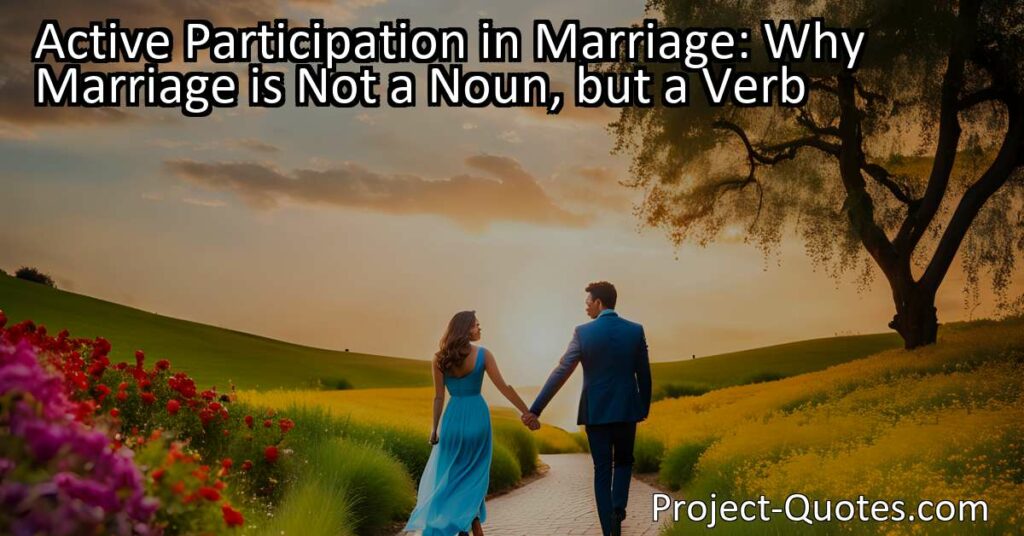Marriage is not a noun it’s a verb. It isn’t something you get. It’s something you do. It’s the way you love your partner every day.
Barbara de Angelis
“Active Participation in Marriage: Why Marriage is Not a Noun, but a Verb” highlights the importance of continuous effort and involvement in a successful marriage. Rather than viewing marriage as a static state, it should be seen as an ongoing journey that requires active participation from both partners. By actively engaging in our marriages through love, communication, and growth, we can create lasting and fulfilled relationships.
Table of Contents
- 1 Marriage is not a noun it’s a verb. It isn’t something you get. It’s something you do. It’s the way you love your partner every day.
- 2 Barbara de Angelis
- 3 Meaning of Quote – Marriage is not a noun it’s a verb. It isn’t something you get. It’s something you do. It’s the way you love your partner every day.
- 4 Freely Shareable Quote Image
- 5 Related
Meaning of Quote – Marriage is not a noun it’s a verb. It isn’t something you get. It’s something you do. It’s the way you love your partner every day.
Marriage is often portrayed as the pinnacle of romantic relationships, a final destination that everyone eagerly seeks to reach. We are bombarded with images of extravagant weddings and tales of fairytale endings. However, it is crucial to understand that marriage is not simply a static state, but an ongoing process that requires active participation and effort from both partners. As the quote suggests, marriage is not a noun, but a verb. It is not something you acquire or achieve, but rather something you actively engage in every day.
When we think of a verb, we envision action, movement, and continuous effort. Similarly, marriage should be viewed as an ever-evolving journey rather than a fixed entity. It is a commitment to love, cherish, and support your partner through all the joys and challenges that life throws your way. This perspective is particularly important for young individuals to understand, as it helps to dispel the notion that marriage is a static state that magically solves all problems.
Love in a marriage should not be seen as a fleeting emotion or a fairytale romance that fades away over time. Instead, it is a conscious decision to prioritize and nurture the relationship with your partner. It involves actively showing affection, kindness, and empathy, even during challenging times.
In the busy and hectic world we live in, it is easy to overlook the importance of consistently investing time and effort into our marriages. We often get caught up in work, daily routines, and personal ambitions, inadvertently neglecting the person we vowed to spend our lives with. However, true fulfillment and happiness in a marriage come from consciously choosing to prioritize our partner and our relationship each day.
The key to maintaining a thriving marriage lies in the little things we do on a daily basis. It is in the good morning kisses, the heartfelt conversations, the shared laughter, and the simple acts of kindness. These seemingly mundane gestures may appear insignificant, but they reinforce the love and connection between partners over time.
Moreover, marriage requires continual communication and active listening. As a verb, it necessitates consistent effort to understand and empathize with your partner’s needs, desires, and concerns. It means creating a safe space for open and honest dialogue, where both partners can express their emotions freely without fear of judgment or dismissal.
Additionally, a strong marriage entails actively working through conflicts and challenges that inevitably arise. Disagreements and misunderstandings are natural parts of any relationship, but how we approach and resolve them can make all the difference. Instead of avoiding or suppressing conflicts, couples should view them as opportunities for growth and understanding. By engaging in respectful and constructive communication, couples can address their differences and find mutually satisfying solutions.
Another crucial element in the verb-like nature of marriage is the willingness to adapt and grow as individuals and as a couple. We are not static beings, and our interests, goals, and personalities evolve over time. It is essential to support each other’s personal growth, dreams, and aspirations. By doing so, couples can foster an environment of encouragement and fulfillment, nurturing their individuality while simultaneously strengthening their bond.
It is important for young individuals to understand that the path to a successful and fulfilling marriage is not without bumps and challenges. The romanticized notion of happily ever after fails to acknowledge the hard work, compromise, and perseverance required to build a lasting partnership. However, this does not mean that marriage is not worth pursuing. On the contrary, a committed and loving marriage can provide profound joy, stability, and support throughout life’s journey.
In conclusion, the quote “Marriage is not a noun; it’s a verb” serves as a powerful reminder that love and happiness in a marriage are not passive experiences but active choices we make every day. It emphasizes the importance of consistent effort, effective communication, and unwavering commitment in nurturing a thriving partnership. By adopting this perspective and actively engaging in our marriages, we can create strong, fulfilling, and enduring relationships that stand the test of time.
I hope this quote inspired image brings you hope and peace. Share it with someone who needs it today!


